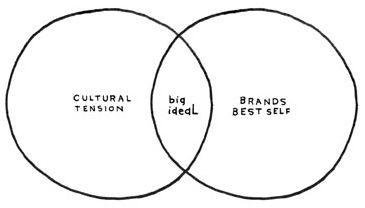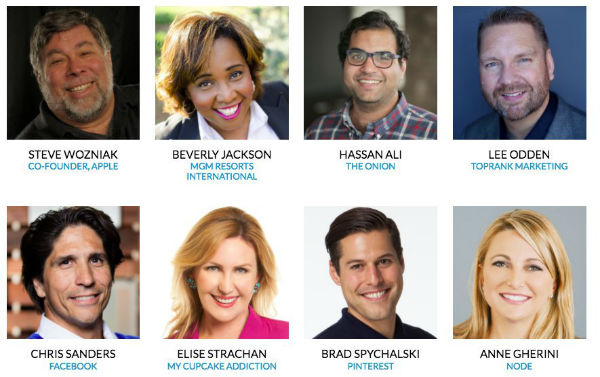
In a world where the average U.S. consumer is confronted with 64GB of data per day, I think it’s safe to say that marketing requires a very different approach.
Marketers all over the world are searching hard for silver bullets and ways to differentiate. And I think a lot of companies are wondering what it will take to realize substantial growth.
It will certainly take more than being “the best answer” at every touchpoint or simply outspending the competition. Who can really afford that?
Growing in today’s world of digital information overload will require something special: Building from purpose and authenticity.
It was purpose and authenticity that was the focus of a presentation I heard at Digital Summit from Mackenzie Fogelson recently. Did you know?
- 63% of consumers would rather buy from a company they consider authentic. (Cohn & Wolfe)
- 73% of consumers care about the company, not just the product when purchasing. (BBMG)
- 50% of purchases are made because of word-of-mouth (Brains on Fire)
Companies focus far too much on how the brand is packaged and who the company is instead of looking at something even more compelling: Purpose, People, Promise. In Mack’s presentation, she drilled down into each.
1. Purpose is the key to growth. Businesses are challenged by an environment of constant change. Consumers expect more from the businesses they support and employees want more meaning in their work. A purpose offers a solution to each of these challenges and drives focus, strategy and growth.
“Purpose-driven companies make more money, have more engaged employees and are better at innovation and transformational change.” Harvard Business Review
Business growth in a digital world starts by clarifying your purpose as a business. “An ideal is a belief system that drives everything a brand does.” For more on that, check out this resource from Ogilvy: ogilvy.com/thebigideal

Image: Ogilvy
For an example of a brand hitting this head on, look at how Dove’s cultural tension tackles low self-esteem and poor body image in girls. Dove’s best self provides a gentle alternative to soap that cares for women’s bodies. Dove’s big ideal, in the middle, is that the world would be a better place if women were allowed to feel good about their bodies.
In this scenario, you can see that Dove’s focus isn’t on soap. It’s on helping women feel good about their bodies and that focus is aligned with their marketing strategy. The result? Let’s just say that Dove experienced a $1.5 billion jump in sales over a decade.
I think the key thing here comes from Jim Stengel, who said this was “not social responsibility or altruism, but a program for profit and improving people’s lives.”
What does that mean to marketers? Building a purpose-driven authentic brand brings growth.
2. People: Bridge the gap between your purpose and your people. Mack talked about their work with Traveling Vineyard. Starting by identifying 3 persona groups who aligned with the company’s purpose, Mack / Genuinely aligned the persona groups with real people from their community.
You can connect your people with purpose by identifying their challenges and goals, then work to understand their behaviors at each stage of the journey. What are they thinking, feeling and doing? With this understanding, you can use content to remove the roadblocks by addressing what customers are thinking, feeling and doing at each stage.
Purpose + People = growth
3. Promise: Your actions as a company afford you a runway with customers. The brand promise
Four steps to growth through a digital strategy:
1. Clarify the purpose of your organization. Purpose (the big ideal) is the intersection of cultural tension and your brand’s best self.
Purpose is:
- Aspirational and belief-driven
- Broader than a company’s products or services
- At the hear of a business model
- Long term, action oriented thinking
- An improvement in customers and employees lives
Purpose is not:
- A vision, mission, or values statement
- Solely focused the internal organization
- Not brand guidelines, corporate responsibility or PR
- A tagline
- A trend
2. Deconstruct your customer’s journey. Figure out what they are thinking, feeling and doing at each stage. Use a customer journey map template (pdf) as a guide.
3. Connect your team’s purpose and your organization’s purpose. Ask yourself: What does the organization as a whole exist to achieve? Also ask, “What role does your team play in achieving that purpose?”
4. Communicate your purpose externally and change the conversation from all about your product to purpose. A focus on purpose opens up the opportunity for your brand to connect in a meaningful way. The combination of promise and purpose is your greatest competitive advantage.
Need proof?
- 85% of purpose-led companies showed positive growth. Harvard Business Review
- 72% of global customers would recommend a company with a purpose. EY
- Employees are 3 times more likely to stay at purpose-driven organizations. Imperative/LinkedIn
The kicker: Only 37% of executives believe their organizations are aligned with purpose.
If that’s not motivation to start this journey to evolve, I don’t know what is.
Mack is the Founder and CEO of Genuinely
If you are in the Los Angeles area April 4-5th, be sure to check out the Digital Summit LA conference #DSLA

I’m going to be the closing keynoting on influencer marketing along with an opening keynote from Beverly Jackson of MGM and a lunchtime interview keynote with Steve Wozniak, co-founder of Apple. There are many other top notch speakers presenting from Facebook, Pinterest, Google, LinkedIn, BET Networks, Adobe, Forbes, The Economist, AOL, BMC Software, MIT, Wells Fargo, The Onion and many more.


